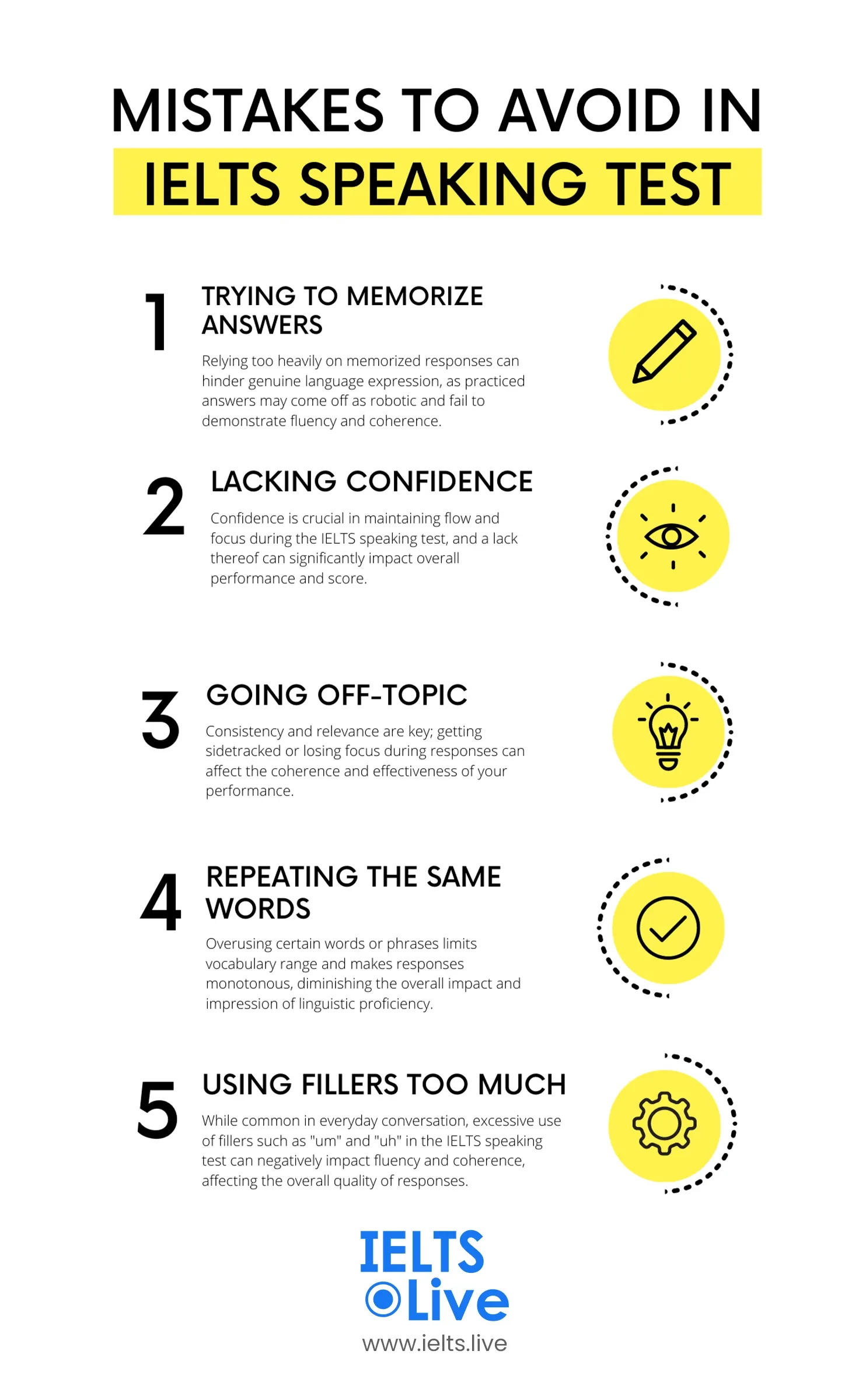
If you’re taking the IELTS speaking test, you must’ve wondered why candidates often fail to achieve the score they are capable of. The answer is simple. They make some small but common mistakes in their exam.
These mistakes are totally avoidable if you remain conscious. But first, it is crucial for us to find out what those mistakes are. That is precisely what we’ll be discussing in today’s blog.
You may also like: Revolutionize Your IELTS Speaking Test: The Unconventional Strategies That Guarantee Success!
Trying to memorize answers
It can be stressful to study for the IELTS speaking test, thus it makes sense to look for shortcuts or certainty in memorizing the answers. However, depending too heavily on memory will hurt your performance and keep you from showing your genuine language skills.
Memorizing answers may appear to be a failsafe approach to preparing for the speaking test, but it has considerable drawbacks. First off, memorized answers may come off as robotic and lack the organic flow of a real conversation. Examinators are trained to spot practiced responses, which can significantly hurt your performance on the fluency and coherence criteria.
Let’s look at some cons of memorization at a glance:
- Sounding robotic and losing spontaneity.
- Forgetting the answer.
- Losing marks in fluency and coherence criteria.
- Limiting your ability to engage in a meaningful conversation.
There are foolproof, amazing alternatives to acing the speaking test to memorization. We will look at those later in this blog.
Lacking Confidence
Speaking with confidence is extremely important because once you lose your confidence, you may lose your flow and that would hurt the test score badly. Many good speakers fail to get a good score due to nervousness or lack of confidence.
When you lose confidence, that makes it difficult to focus on the topic because you’re likely to put your focus into regaining posture. That’s why it is crucial to practice speaking with confidence.
Imagine having the necessary speaking skill to score well but still failing due to nervousness or anxiety. That wouldn’t feel good.
Lack of confidence may result in various damages such as,
- Reducing your ability to express yourself.
- Make you lose focus and as a result, lose your posture.
- Repeated use of filler words such as um, ah, like etc.
We’ll discuss some great tips to help you gain confidence later in this blog.
Going off-topic
Maintaining consistency and relevance in your responses is critical for a successful IELTS speaking test performance. However, it's not uncommon to get sidetracked or lose attention during the test.
You can be penalized in several ways for going off-topic. Such as,
- Lower coherence score.
- Reduced relevance to the topic.
- Missed opportunities to demonstrate your vocabulary, grammar etc.
- Lack of engagement.

Repeating the same words
Avoiding the pitfalls of repeated use of language during the IELTS speaking test is essential if you want to showcase a diverse vocabulary. Repeating the same words and phrases not only lowers your vocabulary range score, but it also makes your responses tedious.
When you use the same words and phrases repeatedly, it gives the impression that your vocabulary is limited and hampers your ability to express yourself properly.
Consider the following example: You're talking about transportation, and you keep using the word "car" without looking up other terms like "vehicle," "automobile," or "mode of transport." This repetition not only limits your word variation but also decreases the overall impact of your response.
Using fillers too much
Fillers, such as "um," "uh," "like," and "you know," are common in everyday conversation and can be used to create a brief pause or delay while gathering thoughts. However, using fillers excessively during the IELTS speaking test can reduce the fluency and coherence of your responses.
Now let’s move on and find out how to avoid these mistakes
Alternatives to memorization
Well, the alternative is very simple. Actually, learning the language. Which I promise isn’t too hard. Stay with me.
- Developing strong language skills: This may sound pretty obvious but it’s a reminder that you have to develop your language skills to get through IELTS. There are no shortcuts. Focus on improving your skills, such as vocabulary, grammar, and pronunciation, in order to broaden your linguistic palette and express yourself more accurately. For example, rather than memorizing a set response to your favourite book, seek to expand your vocabulary by learning about literary genres, writers, and descriptive language. This will allow you to respond honestly and from the standpoint of your knowledge and experiences when asked about your favourite book.
- Regular Practice: Treat language learning like a sport and practice regularly. You may practice in any form, but you must do it. To hone your spontaneous speaking skills, have real conversations with native English speakers, your fellow test-takers, or online practice platforms. Mock speaking tests will help you to identify your weak points and to enhance your grammar, coherence, and clarity.
Building Confidence
Confidence will come with practice and with acknowledging the fact that you lack confidence. Here are some pro tips for building confidence,
- Acknowledging the nerves: Nervousness before speaking tests is normal, but confidence can be cultivated, even in nerve-wracking situations like IELTS. Imagine, for example, that you are asked to talk about a special holiday experience. Recognise your nervous feelings and remind yourself that they are normal rather than letting them rule your life. You can shift the focus to gaining confidence only by acknowledging your nerves.
- Fostering self-belief: Believing in yourself and your ability is the first step towards developing confidence. Recognise that you have prepared for the exam and that you have the language abilities required to communicate effectively. Remind yourself of previous wins and positive comments on your English proficiency.
- Practice speaking aloud: Many of us, including me often feel shy when it comes to practising speaking out loud. It could be for an exam, an interview or a speech. Practising out loud always helps because this allows you to hear yourself talk and that makes you more aware of the mistakes you make while talking.
- Talk to the camera: If you don’t have a partner who lives nearby you can always talk to the camera. By that, I mean record yourself talking and this helps you point out several places to work on and improve.
Staying on topic
In the IELTS speaking test it's important that you stay on the topic. For example, if the examiner asks you about your favourite film and you go on talking about your favourite actor, that doesn’t make much sense right? We need to stay on topic cause otherwise, it may impact your coherence score. Here are some strategies to follow that will help you stay on track:
- Plan and structure the responses: As you hear the examiner ask you the question, start plotting in your mind how you’re going to answer it. Before you start talking take a few seconds to think. This will help you produce a much better and well-put-together response.
- Listen carefully: Make sure you pay attention to what the examiner is saying and understand the question properly. If you don’t understand what is being asked, you may ask them to repeat the question.
- Use Transition Phrases: Include transition phrases and linking words to help guide your answers and keep them coherent. Phrases such as "In addition," "Moreover," or "Furthermore" might help you connect thoughts easily and maintain a logical flow.
Paraphrasing your responses
If you use various words and phrases instead of sticking to one, that creates depth and helps get rid of monotony in your speech. Here is some advice to help you paraphrase better:
- Exploring the thesaurus: Use online or offline thesauruses to find synonyms and alternative phrasing for common words. For example, instead of using the word "happy" frequently, consider synonyms such as "joyful," "delighted," or "ecstatic" to give depth and subtlety to your remarks.
- Keyword Association: Practice associating words with related concepts or bigger categories. This allows you to quickly recall a variety of words when addressing a specific topic. When discussing food, for example, consider adjectives such as "mouthwatering," "flavourful," or "savoury" to describe the taste.
Proper use of fillers
It’s okay to use fillers as long as it sounds natural. Fillers become problematic when they hinder the flow of your speech and prohibit you from demonstrating your true skills. Let’s look at some suggestions on how to use fillers the right way:
- Be conscious of Fillers: Begin by becoming conscious of your use of fillers in regular interactions. Take note of when you naturally insert fillers and make an intentional attempt to reduce their frequency.
- Practise Pausing: Instead of fillers, make a conscious choice to employ meaningful pauses to gather your thoughts. Pausing not only gives you time to reflect, but it also emphasises and clarifies your communication.
- Slow Down Your Speech: Trying to keep up with your thoughts can often lead to the use of fillers. Practise speaking at a reasonable pace, giving yourself enough time to clarify your views clearly without using fillers.
In the competitive world of the IELTS speaking test, avoiding common mistakes and implementing smart methods can make all the difference. You can improve your performance and leave a lasting impression by avoiding memorising, speaking confidently, staying on topic, expanding your vocabulary, and minimising fillers. To reach your full potential, embrace planning, practice, and self-awareness. You are prepared to overcome the IELTS speaking test and make your mark if you are determined and sincere.
Best wishes on your path to success!






0 COMMENTS